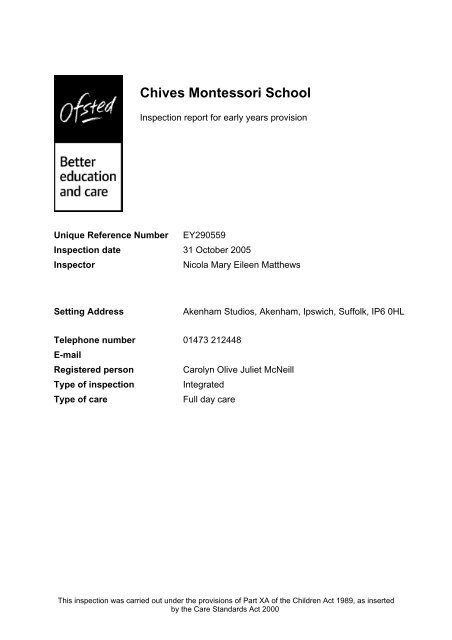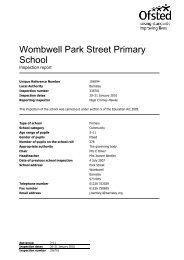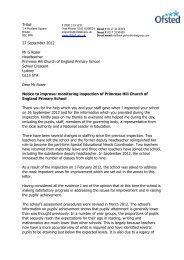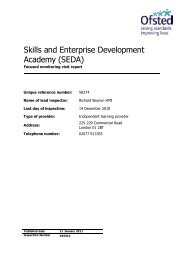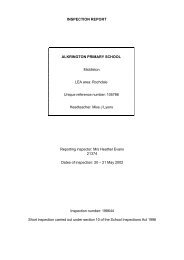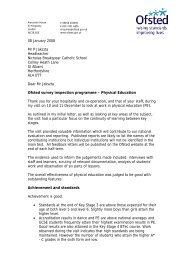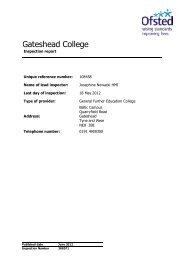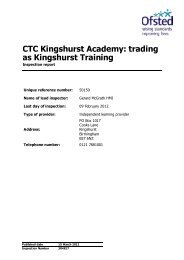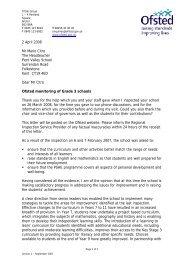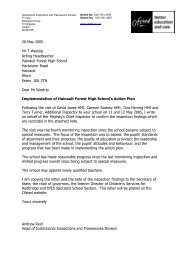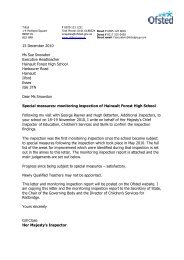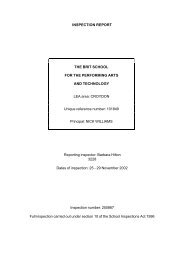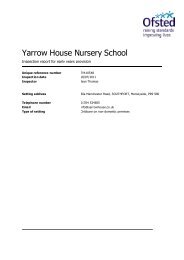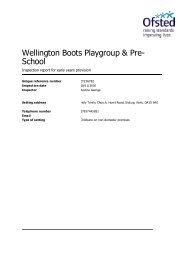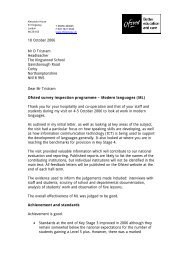Chives Montessori School - Ofsted
Chives Montessori School - Ofsted
Chives Montessori School - Ofsted
You also want an ePaper? Increase the reach of your titles
YUMPU automatically turns print PDFs into web optimized ePapers that Google loves.
<strong>Chives</strong> <strong>Montessori</strong> <strong>School</strong><br />
Inspection report for early years provision<br />
Unique Reference Number EY290559<br />
Inspection date 31 October 2005<br />
Inspector Nicola Mary Eileen Matthews<br />
Setting Address Akenham Studios, Akenham, Ipswich, Suffolk, IP6 0HL<br />
Telephone number 01473 212448<br />
E-mail<br />
Registered person Carolyn Olive Juliet McNeill<br />
Type of inspection Integrated<br />
Type of care Full day care<br />
This inspection was carried out under the provisions of Part XA of the Children Act 1989, as inserted<br />
by the Care Standards Act 2000
ABOUT THIS INSPECTION<br />
The purpose of this inspection is to assure government, parents and the public of the<br />
quality of childcare and, if applicable, of nursery education. The inspection was<br />
carried out under Part XA Children Act 1989 as introduced by the Care Standards<br />
Act 2000 and, where nursery education is provided, under Schedule 26 of the <strong>School</strong><br />
Standards and Framework Act 1998.<br />
This report details the main strengths and any areas for improvement identified<br />
during the inspection. The judgements included in the report are made in relation to<br />
the outcomes for children set out in the Children Act 2004; the National Standards for<br />
under 8s day care and childminding; and, where nursery education is provided, the<br />
Curriculum guidance for the foundation stage.<br />
The report includes information on any complaints about the childcare provision<br />
which <strong>Ofsted</strong> has received since the last inspection or registration or 1 April 2004<br />
whichever is the later.<br />
The key inspection judgements and what they mean<br />
Outstanding: this aspect of the provision is of exceptionally high quality<br />
Good: this aspect of the provision is strong<br />
Satisfactory: this aspect of the provision is sound<br />
Inadequate: this aspect of the provision is not good enough<br />
For more information about early years inspections, please see the booklet Are you<br />
ready for your inspection? which is available from <strong>Ofsted</strong>'s website:<br />
www.ofsted.gov.uk.<br />
THE QUALITY AND STANDARDS OF THE CARE AND NURSERY EDUCATION<br />
On the basis of the evidence collected on this inspection:<br />
The quality and standards of the care are good. The registered person meets the<br />
National Standards for under 8s day care and childminding.<br />
The quality and standards of the nursery education are good.<br />
WHAT SORT OF SETTING IS IT?<br />
<strong>Chives</strong> <strong>Montessori</strong> <strong>School</strong> is privately owned. It opened at its present location in 2005<br />
and operates from 3 rooms in a single storey building. There are separate kitchen<br />
and staff facilities. The school is situated north west of Ipswich in the rural location of<br />
Akenham near Henley. A maximum of 30 children may attend the nursery at any one<br />
time. The nursery is open each week day from 09:15 to 15:00 during term time and<br />
some days in the school holiday. All children have access to a secure enclosed<br />
This inspection was carried out under the provisions of Part XA of the Children Act 1989, as inserted<br />
by the Care Standards Act 2000
outdoor play area.<br />
There are currently 39 children from 2 to 5 years on roll. Of these 25 children receive<br />
funding for nursery education. Children come from a wide catchment area. The<br />
school currently supports a few children with Special Educational Needs and children<br />
who speak English as an additional language.<br />
The school employs six staff. All the staff, including the manager, holds appropriate<br />
early years qualifications. There are two members of staff currently improving their<br />
qualification.<br />
THE EFFECTIVENESS OF THE PROVISION<br />
Helping children to be healthy<br />
The provision is satisfactory.<br />
Children are cared for in a well maintained environment where good attention is given<br />
to cleanliness of the classrooms. Their health is compromised by the dirty kitchen<br />
floor and poor personal hygiene procedures during snack time and when going to the<br />
toilet. The younger children are supported well by the staff and encouraged to wash<br />
their hands after toileting. All children wash their hands before lunch and prior to<br />
participating in a cooking activity.<br />
Children's dietary needs are well met. The parents provide a packed lunch of which<br />
the contents are monitored by the staff to ensure children are eating healthily.<br />
Children are encouraged to eat the savoury items before progressing onto the fruit,<br />
yoghurts and biscuits. Children can access drinks throughout the day. The pre-school<br />
children have a snack bar during the morning session. They independently pour<br />
themselves a drink and choose what fruit to eat.<br />
Children's emotional well-being is supported by caring staff who acknowledge the<br />
less confident children's distress by being very close to them when the parents leave.<br />
They are encouraged to use a familiar favourite toy to help feel a sense of belonging.<br />
Children settle quickly and start to confidently explore the environment.<br />
Children enjoy physical activity. They have a programmed outdoor session each day,<br />
weather permitting, where they run, chase, push trolleys and ride wheeled toys which<br />
develops their balance and coordination. Some children experience dance and tennis<br />
lessons once a week.<br />
Protecting children from harm or neglect and helping them stay safe<br />
The provision is good.<br />
Children are cared for in a safe and secure environment where all visitors are<br />
monitored. Children are able to play safely in the two playrooms as staff implement<br />
many safety procedures. However, some hazards are not minimised and this<br />
compromises the pre-school children's safety. Children are closely supervised and<br />
This inspection was carried out under the provisions of Part XA of the Children Act 1989, as inserted<br />
by the Care Standards Act 2000
play safely outdoors.<br />
Children learn safe practices because the staff provide explanations as to why they<br />
should not do something. This helps develop their understanding of hazards and to<br />
take responsibility for themselves. Children use a wide range of good quality play<br />
equipment much of which follows the <strong>Montessori</strong> philosophy. They safely access the<br />
activities as they are stored on low level shelving on trays or in boxes.<br />
Children's welfare is effectively promoted and safeguarded through clear policies and<br />
procedures that staff are aware of. For example, staff hold current first aid certificates<br />
and have knowledge of child protection procedures in line with the Area Child<br />
Protection Committee guidance.<br />
Helping children achieve well and enjoy what they do<br />
The provision is good.<br />
Children arrive and confidently hang their coats up on named pegs and find their<br />
name card to take into the pre-school room to wait for registration. They wait for the<br />
majority of children to arrive before an activity starts. The younger children sit with the<br />
older ones for a story where, at times, some children are disruptive and do not<br />
concentrate. This makes it difficult for the others to become engaged in the story.<br />
The younger children enjoy a good range of <strong>Montessori</strong> activities and persevere to<br />
complete a task that requires good hand to eye coordination. For example, sweeping<br />
up dried peas using the dust pan and brush. They are developing their independence<br />
well as they choose from the range of activities available and receive sensitive<br />
support from the staff. However, the craft activities, which are initiated and mainly<br />
completed by the staff, are too challenging for the younger child. This limits their<br />
creativity when responding to ideas and experiences.<br />
All children are developing good social skills and the more able ones confidently and<br />
spontaneously use please and thank you.<br />
Nursery Education<br />
The quality of teaching and learning is good. Children are making good progress<br />
towards the early learning goals as they use the <strong>Montessori</strong> and other equipment.<br />
However, omissions in the short term planning limit individual children's progress.<br />
Children's self initiated play is well supported by the patient and caring staff. They<br />
use questioning effectively to enable children to demonstrate what they know and<br />
challenge some thinking. For example, children looked at pictures of the countryside<br />
and had to predict what the weather might be; hot, warm, cold or cool. They then<br />
grouped them under these headings which encouraged them to try and recognise<br />
simple words.<br />
Children experience a well ordered environment where activities have a permanent<br />
storage place on low level shelving around the perimeter of the room. They<br />
independently take an activity to the table or floor and practise the skills required to<br />
This inspection was carried out under the provisions of Part XA of the Children Act 1989, as inserted<br />
by the Care Standards Act 2000
successfully complete the task such as building a cube using rectangular blocks. The<br />
staff direct the children in activities that are challenging and then allow the child time<br />
to practise and consolidate the new knowledge. Children are expected to sit in adult<br />
led groups for long periods of time at the beginning and end of the morning session.<br />
They loose concentration which limits their learning.<br />
Children's assessment records, which follow the <strong>Montessori</strong> exercises, are used to<br />
record children's progress; these are not linked to the stepping stones. However, in<br />
the near future 'Keeping Track', developed by <strong>Montessori</strong>, is being introduced and<br />
this is linked to the stepping stones. Children are not assigned a key worker. All staff<br />
contribute to the assessment records.<br />
Children's language development is very good. They are confident and articulate<br />
communicators initiating conversations with the staff and each other. Children<br />
effectively recall what they have done at home or at <strong>Chives</strong> <strong>Montessori</strong> <strong>School</strong> in the<br />
past. Children know many letter sounds and can recognise simple words and their<br />
names. They confidently write their names and form the letters correctly, often talking<br />
about the construction of the letter as they write it. Children have opportunities to<br />
make marks on paper. They use marks to represent writing in home made story<br />
books and draw flowers in a pot. Children enjoy traditional stories and then act out<br />
the scenario, for example Red Riding Hood, with support from the staff. They<br />
confidently join in circle games and songs taking part in the actions and singing the<br />
words with enthusiasm. However, they do not independently explore musical sounds<br />
and rhythms.<br />
Children are developing very good recognition of number. They use their fingers to<br />
show how many they are talking about and count with a purpose such as how many<br />
children are present today. Children initiate their own counting as they listen to<br />
stories and then count the items on a page. They use mathematical language in their<br />
play such as bigger, smaller, round, square, lots and few. Children handle and<br />
construct with resources that are 2D and 3D and learn about tessellation and<br />
patterns. They enjoy cooking buns where they help weigh the ingredients, mix them<br />
together and notice the change once everything has been combined.<br />
Children confidently use magnifying glasses to explore objects, words and pictures.<br />
They are learning about the weather and can confidently identify some features of<br />
winter accurately. Children are able to develop their understanding of other countries<br />
and cultures through topic work exploring animal life and festivals. The more able<br />
children are able to recognise some continents' names and shapes as they play with<br />
the large wooden jigsaw and globe.<br />
Children explore colour as they paint using a variety of brushes and techniques. They<br />
explore man-made and natural materials as they handle the resources. Children<br />
show delight in running lentils or glue through their hands and making marks in the<br />
orange sand. They use their imagination well when playing in the shop acting out<br />
familiar scenarios and as they make up stories about a farm.<br />
Helping children make a positive contribution<br />
This inspection was carried out under the provisions of Part XA of the Children Act 1989, as inserted<br />
by the Care Standards Act 2000
The provision is good.<br />
Children experience a meaningful range of resources and activities to promote a<br />
positive view of the wider world and increase their awareness of diversity and<br />
understanding of others. They learn about continents and countries and how people<br />
look and live in these areas as well as geographical features such as pyramids and<br />
mountains. Children learn about their local community as they go for walks around<br />
the farm.<br />
Children play harmoniously alongside each other, they share and take turns<br />
amicably. Older children understand the rules and help reinforce these by telling<br />
others, for example not to run. They play imaginatively in small groups and are<br />
making friendships as they seek out a preferred playmate. Children are becoming<br />
socially competent as they say please and thank you and participate in circle time at<br />
the end of the day to say goodbye to everyone. They demonstrate good levels of<br />
independence in personal care such as changing clothes and putting on coats and<br />
shoes. Children show a sense of wonder, pleasure and pride. The provision fosters<br />
children's spiritual, moral, social and cultural development.<br />
The partnership with parents is good. They receive clear information about what their<br />
child has done during the day. The staff complete a white board in the entrance hall<br />
detailing activities children have participated in. Evening meetings are organised to<br />
help parents understand the <strong>Montessori</strong> philosophy and to show they can continue<br />
this at home and take an active part in their children's early education. Children's<br />
healthy eating is promoted by a dietician visiting to explain what is suitable to put in a<br />
packed lunch box. Parents can ask to see their children's assessment records and<br />
the staff spend time explaining to parents how their child is progressing. Parents<br />
speak highly of the setting. If they should need to complain then a complaints<br />
procedure is available and a record will be kept which they can request to see.<br />
Organisation<br />
The organisation is satisfactory.<br />
Systems are in place to ensure staff working with the children during term time are<br />
safe to do so. The recruitment procedure is robust and staff display their<br />
qualifications in child care and education in the entrance hall. However, some<br />
temporary holiday staff do not always go through the robust employment procedures<br />
which could compromise children's safety. The staff team work well together to<br />
create and maintain a caring environment for children.<br />
The quality of leadership and management of the nursery education is satisfactory.<br />
The manager takes responsibility for most of the responsible roles in the provision.<br />
The staff's effectiveness is monitored through an annual appraisal system where<br />
professional development is encouraged. Training is given high priority and some<br />
staff are currently completing their <strong>Montessori</strong> qualification to enable them to help all<br />
children achieve well.<br />
Documentation is satisfactory, policies and procedures are in place and comply with<br />
current legislation and promote children's well-being. The needs of the children for<br />
This inspection was carried out under the provisions of Part XA of the Children Act 1989, as inserted<br />
by the Care Standards Act 2000
who the setting provides are met.<br />
Improvements since the last inspection<br />
Not applicable.<br />
Complaints since the last inspection<br />
The provider is required to keep a record of complaints made by parents, which they<br />
can see on request. The complaints record may contain complaints other than those<br />
made to <strong>Ofsted</strong>.<br />
THE QUALITY AND STANDARDS OF THE CARE AND NURSERY EDUCATION<br />
On the basis of the evidence collected on this inspection:<br />
The quality and standards of the care are good. The registered person meets the<br />
National Standards for under 8s day care and childminding.<br />
The quality and standards of the nursery education are good.<br />
WHAT MUST BE DONE TO SECURE FUTURE IMPROVEMENT?<br />
The quality and standards of the care<br />
To improve the quality and standards of care further the registered person should<br />
take account of the following recommendation(s):<br />
•<br />
•<br />
ensure fire exits are not obstructed and hazards are minimised (this refers to<br />
uncovered electric sockets and access to unused rooms)<br />
ensure all temporary staff have completed the vetting process and are<br />
suitable to work with children.<br />
The quality and standards of the nursery education<br />
To improve the quality and standards of nursery education further the registered<br />
person should take account of the following recommendation(s):<br />
•<br />
•<br />
•<br />
develop a key worker system so each child's progress is effectively monitored<br />
improve the curriculum planning so that it is linked to the stepping stones and<br />
is informed by each child's assessments to help them progress in their<br />
learning.<br />
organise the large group sessions so all children are able to concentrate and<br />
sit quietly<br />
This inspection was carried out under the provisions of Part XA of the Children Act 1989, as inserted<br />
by the Care Standards Act 2000
Any complaints about the inspection or the report should be made following the<br />
procedures set out in the leaflet Building better childcare: Compliments and<br />
concerns about inspectors' judgements which is available from <strong>Ofsted</strong>'s website:<br />
www.ofsted.gov.uk<br />
This inspection was carried out under the provisions of Part XA of the Children Act 1989, as inserted<br />
by the Care Standards Act 2000


